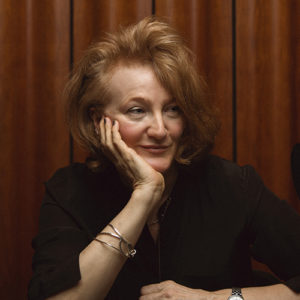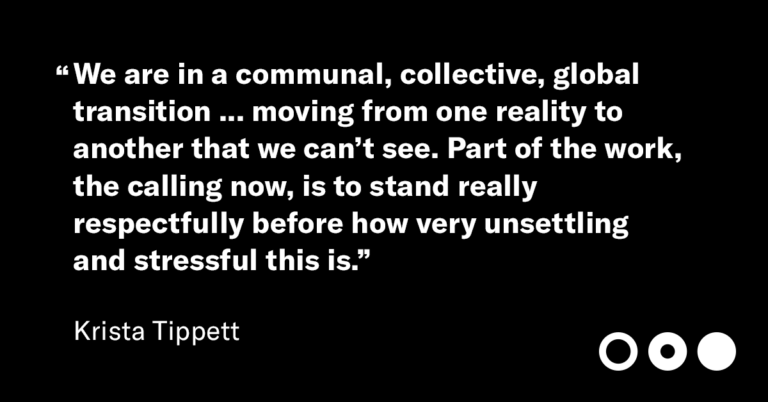Living the Questions
How can we balance connection with disconnection?
To a question from listener Vanessa Parfett in Melbourne, Krista reflects on “Zoomzaustion” and relearning the primacy of our bodies. Also, how this helps explain poetry’s rise in our midst, and can make us more whole.
Living the Questions is an occasional On Being segment where Krista muses on questions from our listening community. Submit your own at [email protected].
Guest

Krista Tippett created and leads The On Being Project and hosts the On Being radio show and podcast. She’s a National Humanities Medalist, and The New York Times bestselling author of Becoming Wise: An Inquiry into the Mystery and Art of Living. Read her full bio here.
Transcript
This transcript has been lightly edited for readability.
Vanessa Parfett: Hey, Krista. My name is Vanessa and I’m calling from Melbourne, Australia. I’m curious to hear your thoughts, given the current situation the world finds itself in, how we can find connection in disconnection. I think we all have a duty for the health and wellbeing of our world and people that live in it to disconnect. But in a time where connection has never been so important, how do we balance the two? How do we disconnect physically while remaining emotionally, socially, connected to others?
Krista Tippett: It’s such an interesting question, so thank you, Vanessa. It’s such an interesting question, in one way, because what’s coming to mind, for me, in my own experience of what you’re describing, has evolved a lot in these weeks of lockdown, quarantine, forced disconnection — physical disconnection, as you say. I will try to see if I have anything really practical to add, in terms of advice. Really, what the question makes me want to do is reflect on, this week, some of the things I feel like I’m learning, or some of the things that maybe this strange experience is teaching me, is teaching us.
Something that I’ve thought about across the years, but now feels like the most present thing, is just the primacy of our bodies. I’ve thought so much about how, in the western world and in modernity, we’ve just structured so many sophisticated and inventive ways of pretending like everything doesn’t always come back to our bodies. It begins and ends in our bodies, and there’s mess and frailty there, and limitation, but also energy, and life itself.
So I’ve been thinking about what I’m calling Zoomzaustion. The technology is so miraculous. But this experience of only connecting to each other by way of pixels is also really laying out some of the very severe limitations of it. So one thing I’ve become aware of — that I’ve never thought about before — is how much energy we actually draw from each other, raw energy, at a primal, animal level, when we are in the room together. And that doesn’t communicate through the screen — the view of someone’s face and, to some extent, the emotions that can be read and responded to there, the voice, which I feel is so embodied.
I think that the way I feel, and everybody I’m talking to feels, so completely worn out and depleted by the only connection being by way of technology, has something to do with the fact that we’re not replenishing our basic stores of life energy, through our bodies. What I’m realizing now is that that happens all the time. It happens whether I’m enjoying being with somebody or not enjoying with somebody; it happens no matter what we’re talking about or if we’re sitting silently in a room together. It’s a physical, animal thing.
And so I’m pondering what a new, deepened sense of that means; why it matters. At the same time, I think we’re learning ways to use these technologies for connection; we’re learning by way of things that go well, and things that go badly that will also serve us. It’s both/and. What’s interesting to me, too, about this is that I am such an introvert. And there’s part of me that’s very comfortable being alone. But this thing I’m talking about, this is not an introverted thing. It’s not an extroverted thing. It’s a human thing; it’s an animal thing.
I’ve been thinking, also — [laughs] strangely — that one reason poetry is becoming even more of a connector, kind of a lifeline, is because poetry is actually language — a form of words, as much as words, language that lands in our bodies as much as in our minds. It plants us in our bodies. It plants us in memory and sensation and emotion; it connects those things up with words and ideas and concepts. And a lot of the language we deal with in public — the language that becomes defining, that is serious, the way we talk about everything from a pandemic to any other subject — is very rational, head-based language.
I think that we’ve been on this trajectory anyway, societally. That this experience is hastening a becoming more whole. That there’s been this charade of fracture and difference but our bodies — mind, body, spirit, which in fact are physically the same thing, as we’re learning — they’ve known this wholeness. And somehow, I think, this realization of the primacy of our bodies, of our frailty, of our three-dimensionality — that the connection we have to each other is so much more and so much more basic than the way we would’ve described all the things that are happening between us. It’s embodied. And so poetry is one way we’re reaching not just to express that but to evoke it, to feel it. It’s this dance right now, as you say.
What was that beautiful phrase that you had, Vanessa — the “duty” to disconnect, in order to help do our part to keep everyone healthy, not just ourselves? And the absolute imperative, the way we need to connect to be alive. It’s a dance none of us would’ve wished for.
But, like so much else about this moment, I think the best we can do is try, in the moments when it’s not all too much — and for me, right now, there are hours and days when it’s too much, but in the moments when we find we can breathe — to think about what we’re learning. And to let that have its place in us. Again, poetry may be a way to anchor that so that we let these experiences, also, flow into what I do think is our ongoing evolution of learning, relearning, again, to be more whole within ourselves and with each other.

Reflections